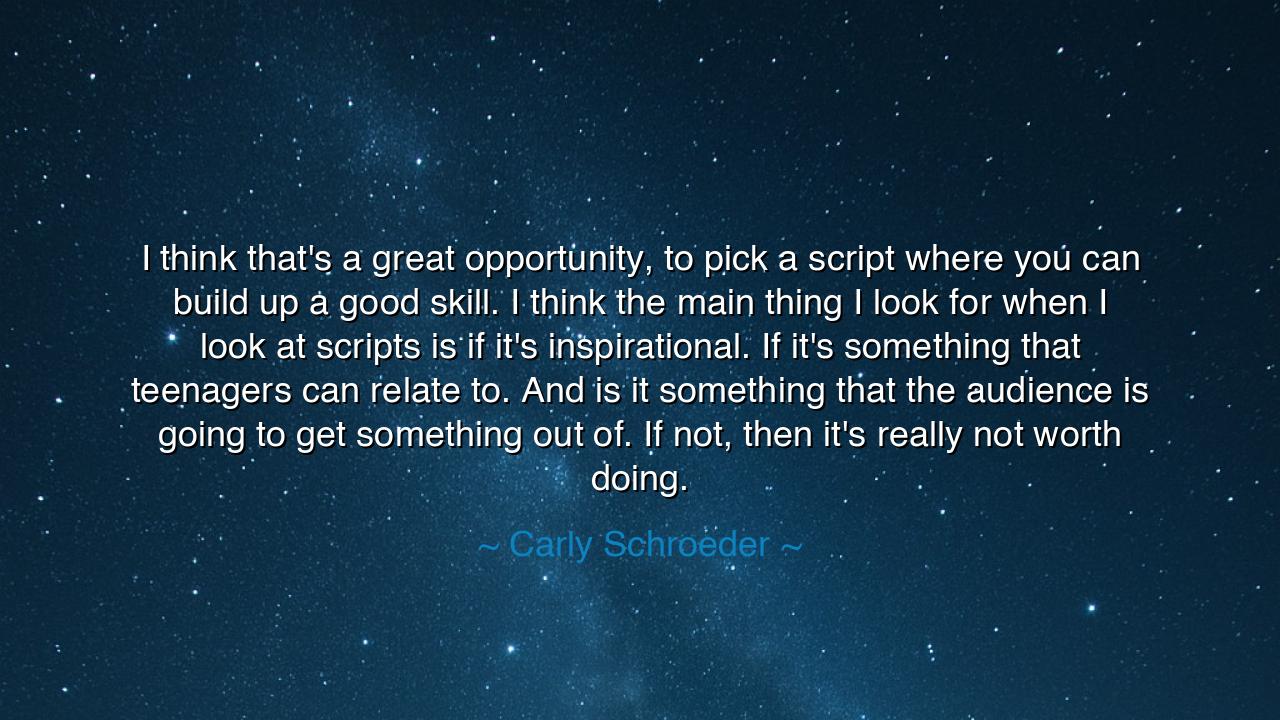
I think that's a great opportunity, to pick a script where you
I think that's a great opportunity, to pick a script where you can build up a good skill. I think the main thing I look for when I look at scripts is if it's inspirational. If it's something that teenagers can relate to. And is it something that the audience is going to get something out of. If not, then it's really not worth doing.






In the words of Carly Schroeder, spoken with a clarity that transcends her craft, we find not merely the reflections of an actress, but the philosophy of an artist devoted to purpose: “I think that's a great opportunity, to pick a script where you can build up a good skill. I think the main thing I look for when I look at scripts is if it's inspirational. If it's something that teenagers can relate to. And is it something that the audience is going to get something out of. If not, then it's really not worth doing.” These words are more than professional advice; they are a testament to the eternal question every creator must face — why do we create at all?
In her reflection, Schroeder unveils a truth that is as old as storytelling itself: art is not meant merely to entertain, but to enlighten. In a world overflowing with noise and spectacle, she reminds us that creation without meaning is an empty gesture. The artist, whether actor, painter, or poet, bears a sacred responsibility — to awaken hearts, to challenge thought, to remind humanity of its shared flame. By seeking roles that are inspirational, Schroeder chooses not only her scripts, but her legacy. She seeks to craft stories that do not fade with the credits, but linger in the spirit of the audience, urging them toward growth and reflection.
This idea, though expressed in the language of film, echoes the wisdom of the ancients. The philosopher Plato spoke of art as a mirror for the soul — a reflection of what we are and what we may become. To him, the purpose of poetry and drama was not simply pleasure, but the cultivation of virtue. Schroeder’s search for relatability and inspiration aligns with this sacred duty. She does not wish to stand before her audience as a distant star, but as a bridge — a voice that resonates with the young and restless, those seeking truth in the chaos of growing up. Through her choices, she embodies the belief that the greatest art speaks not from above, but from within.
Consider the example of Sophocles, the great dramatist of ancient Greece. His plays did not exist merely for entertainment; they were lessons in moral endurance, courage, and the human condition. In Antigone, he asked his audience to wrestle with the conflict between law and conscience. In Oedipus Rex, he reminded them that wisdom is born of suffering. Each story carried a weight, a lesson, a challenge to reflect on life’s deepest questions. Schroeder’s standard — that a role must give the audience “something to get out of” — is the modern echo of this same calling. She, like Sophocles, understands that art without substance is a feast without nourishment.
In her words, we also hear the voice of discernment, a virtue too often forgotten in the pursuit of fame. To say, “If not, then it’s really not worth doing,” is to choose integrity over indulgence, meaning over money, purpose over popularity. It is a quiet act of rebellion against mediocrity, a vow that not all work is sacred simply because it is seen. The ancients called this areté — excellence not of talent alone, but of character. For the true artist knows that one’s craft must serve something greater than the self. To accept only what uplifts is to align art with virtue, and in doing so, to make creation an act of worship.
Yet, her emphasis on teenagers reveals something even more profound. To speak to the young is to shape the future. Schroeder’s desire to choose stories that resonate with youth shows a deep understanding of her influence. The young are mirrors — open, impressionable, seeking identity and guidance. To inspire them through honest, relatable storytelling is to plant seeds of courage and empathy in the soil of generations to come. She reminds us that what we choose to create — and consume — forms the moral language of tomorrow. The artist who chooses truth over glamour gives to the world not just entertainment, but awakening.
So, dear listener, take this teaching to heart. Whether you are an artist, a worker, a teacher, or a dreamer, ask yourself what purpose your work serves. Does it uplift? Does it teach? Does it leave the world richer than before? If not, as Schroeder warns, it may not be worth doing. For every act — great or small — leaves a trace upon the world. Make yours one of inspiration, of integrity, of meaning.
The lesson is eternal: to create without conscience is to build without foundation. But to create with the intention to heal, to connect, and to inspire — that is to participate in the divine work of humanity. Let every choice you make, like Carly Schroeder’s, be guided not by applause, but by impact. For when your work becomes a vessel for truth, you too will find that the greatest opportunity in life is not to be seen — but to awaken something sacred in the hearts of those who do the seeing.






AAdministratorAdministrator
Welcome, honored guests. Please leave a comment, we will respond soon